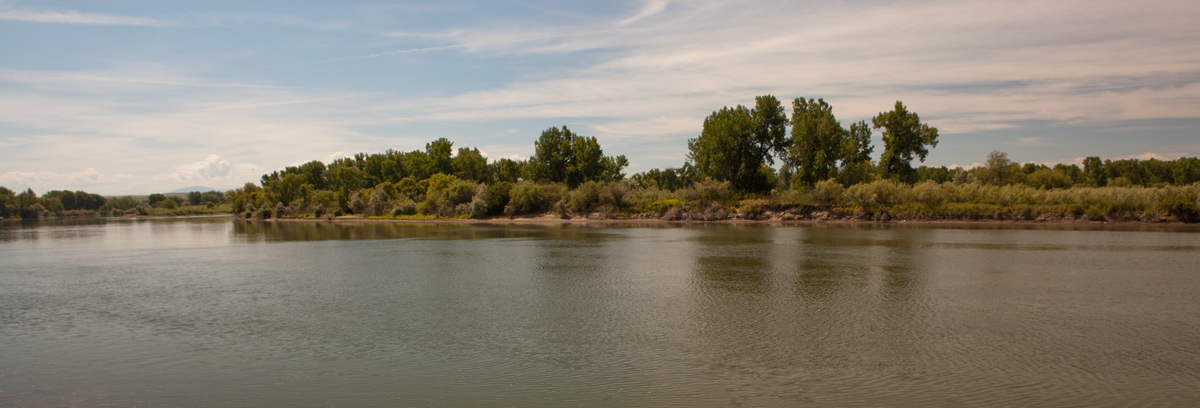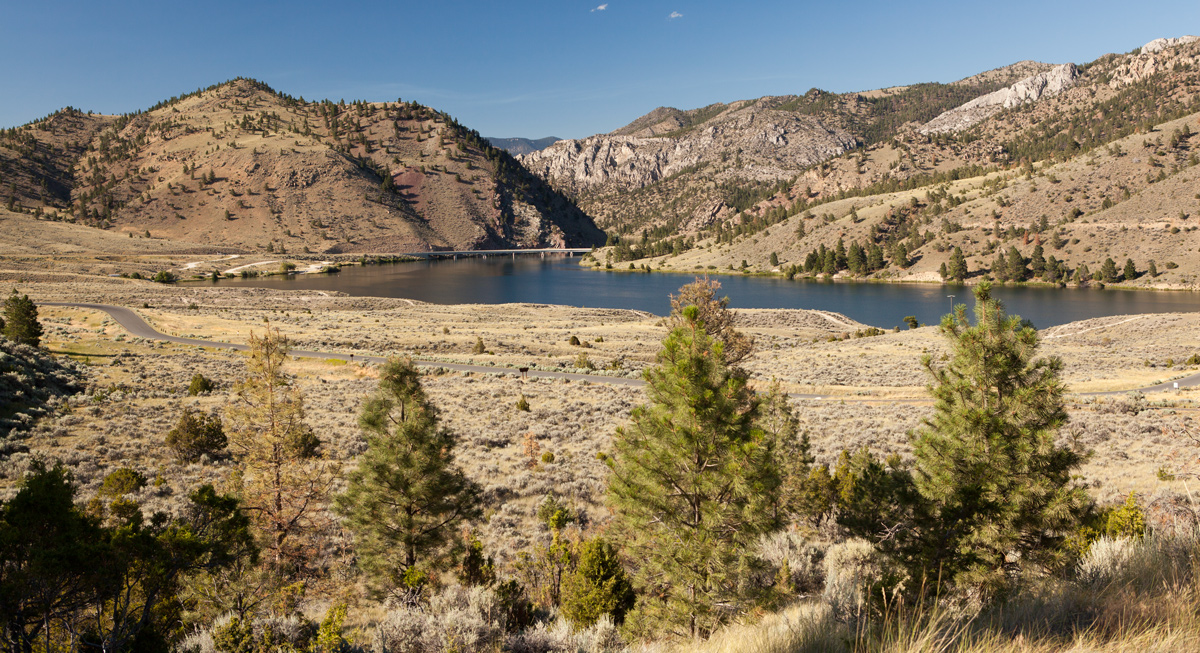Clark and his group cross present Bozeman Pass and arrive at the Yellowstone River. They name a river after Pvt. Shields, but they do not find any trees large enough to build canoes.
Lewis and his group remain at camp above the Great Falls of the Missouri where mosquitoes torment his dog Seaman.
In three other detachments, Pvt. McNeal clubs a grizzly bear with his musket while on his way to the Lower Portage Camp. Drouillard is still away searching for missing horses, and Sgt. Ordway and his group paddle the dugouts down the Missouri.[1]For more on the captains’ strategy and various groups after leaving Travelers’ Rest, see Dividing Forces at Travelers’ Rest.
From Cantonment Belle Fontaine at the mouth of the Missouri, Zebulon Pike‘s Southwest expedition begins.
Clark Finds the Yellowstone
Over Bozeman Pass
we collected our horses and after an early brackft at 8 A M Set out and proceeded up the branch to the head thence over a low gap in the mountain thence across the heads of the N E. branch of the fork of Gallitins river which we Camped near last night passing over a low dividing ridge to the head of a water Course which runs into the Rochejhone, prosueing an old buffalow road
—William Clark
Shield’s River
in the evening after the usial delay of 3 hours to give the horses time to feed and rest and allowing our Selves time also to Cook and eate Dinner, I proceeded on down the river on an old buffalow road at the distance of 9 miles below the mountains Shield River discharges itself into the Rochejhone on it’s N W. side above a high rocky Clift
—William Clark
Insufficient Timber
the mountains have Some scattering pine on them, and on the Spurs and hill Sides there is some scrubby pine. I can See no timber Sufficient large for a Canoe which will Carry more than 3 men and Such a one would be too Small to answer my purpose
—William Clark
Weather Diary (Clark)
State of the weather at Sun rise Wind at Sun rise State of the weather at 4 P. M Wind at 4 P M. fair S E. by E fair N E Struck the river Rochejhone 120 yds wide water falling a little
—William Clark[2]To assist the reader of this web page, the date column is omitted and some abbreviations have been spelled out.
Lewis Prepares Another Portage
Missouri River near White Bear Islands
© 1 July 2013 by Kristopher K. Townsend. Permission to use granted under the Creative Commons Attribution-Share Alike 4.0 International license.
Checking on Lower Portage Camp
Dispatched McNeal early this morning to the lower part of portage in order to learn whether the Cash and white perogue [pirogue] remained untouched or in what state they were . . . . a little before dark McNeal returned with his musquet broken off at the breech.
—Meriwether Lewis
McNeal Clubs Grizzly
on his arrival at willow run he had approached a white bear within ten feet without discover him the bear being in the thick brush, the horse took the allarm and turning short threw him immediately under the bear; this animal raised himself on his hinder feet for battle, and gave him time to recover from his fall which he did in an instant and with his clubbed musquet he struck the bear over the head and cut him with the guard of the gun and broke off the breech, the bear stunned with the stroke fell to the ground and began to scratch his head with his feet; this gave McNeal time to climb a willow tree which was near at hand and thus fortunately made his escape.
—Meriwether Lewis
Horses Remain at Large
at 1 P. M. Drewyer returned without the horses and reported that after a diligent surch of 2 days he had discovered where the horses had passed Dearborn’s river at which place there were 15 lodges that had been abandoned about the time our horses were taken
—Meriwether Lewis
Mosquitoes Torment Seaman
the musquetoes continue to infest us in such manner that we can scarcely exist; for my own part I am confined by them to my bier at least ¾ths of my time. my dog [Seaman] even howls with the torture he experiences from them, they are always most insupportable, they are so numerous that we frequently get them in our thrats as we breath.—
—Meriwether Lewis
Weather Diary (Lewis)
State of the weather at rise
Wind at rise
State of the weather at 4 P. M. Wind at 4 P. M. fair S W fair E —Meriwether Lewis
Ordway Proceeds on Very Well
Missouri River from Two Camps Vista
© 13 July 2013 by Kristopher K. Townsend. Permission to use granted under the Creative Commons Attribution-Share Alike 4.0 International license.
a fair morning. we Set out at light and proceed on verry well overtook Collins who had killed three deer about 9 A. M. we halted for breakfast & Collins killed a fat buck & P. Cruzatte killed a goat or antelope [pronghorn]. we proced. on verry well the currents are common & ripe. Colter killed a panther a deer and a rattle Snake. in the evening we Camped in the mountains. Collins killed 4 Elk. the Musquetoes verry troublesom in deed.
—John Ordway
Zebulon Pike’s Southwest Exploration Begins
We sailed from the landing at Belle Fontaine, about 3 o’clock P.M. in two boats. Our party consisted of two lieutenants, one surgeon, one serjeant, two corporals, sixteen privates, and one interpreter. We had also under our charge, chiefs of the Osage and Pawnees, who, with a number of women and children, had been to Washington.
—Zebulon M. Pike[3]Donald Jackson, The Journals of Zebulon Montgomery Pike (Norman, Oklahoma: University of Oklahoma Press, 1966), 290.
Experience the Lewis and Clark Trail
The Lewis and Clark Trail Experience—our sister site at lewisandclark.travel—connects the world to people and places on the Lewis and Clark Trail.
Plan a trip related to July 15, 1806:
- Bozeman Pass (Clark)
- Yellowstone Gateway Museum (Clark)
- Three Forks to Billings Driving Tour (Clark)
- Lewis and Clark National Historic Trail Interpretive Center (Lewis)
- Two Camps Vista at York (Ordway)

The Great Falls Portage is a High Potential Historic Site along the Lewis and Clark National Historic Trail managed by the U.S. National Park Service. It includes Sulphur Springs (open to the public) and Lower Portage camp site (private land), and the Upper Portage Camp Overlook.
Bozeman Pass and Sacajawea Park are a High Potential Historic Sites along the Lewis and Clark National Historic Trail managed by the U.S. National Park Service. Sacajawea Park is managed by the City of Livingston.
Sacagawea Park is a High Potential Historic Site along the Lewis and Clark National Historic Trail managed by the U.S. National Park Service. This Livingston city park commemorates the expedition’s entry into the Yellowstone River valley.
Notes
| ↑1 | For more on the captains’ strategy and various groups after leaving Travelers’ Rest, see Dividing Forces at Travelers’ Rest. |
|---|---|
| ↑2 | To assist the reader of this web page, the date column is omitted and some abbreviations have been spelled out. |
| ↑3 | Donald Jackson, The Journals of Zebulon Montgomery Pike (Norman, Oklahoma: University of Oklahoma Press, 1966), 290. |





